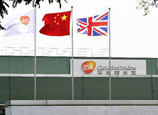
BEST GROWTH SINCE 2011
The April-June period of 2013 was the first time the British economy has grown for two successive quarters since 2011. A number of distorting factors has meant GDP had been erratic around a marginally growing trend in 2012 when GDP edged up just 0.2 percent overall.
"The marked pick-up in GDP growth in Q2 is highly unlikely to deter the BOE from adopting forward guidance on monetary policy in August and making it absolutely clear that any rise in interest rates is a long way off," said Howard Archer, UK and European economist at IHS Global Insight.
"However, the much improved GDP growth does fuel belief that the BOE is more likely than not done on Quantitative Easing, barring a marked relapse in economic activity over the coming months," he added.
"With GDP growth not only accelerating appreciably but also becoming more broadly based in the second quarter, it does appear that economic activity may finally be establishing a firmer footing," he said.
Archer said that it was "highly likely" that consumer spending saw appreciable expansion and contributed markedly to growth.
Consumer spending accounts for 63 percent of GDP on the expenditure side. Data already available show that retail sales volumes expanded 0.9 percent quarter on quarter in the first quarter.
In addition, indications are that consumer spending on services rose in the second quarter, for example, the services data show a 1.5 percent quarter on quarter rise in the output of the distribution, hotels and catering sector, said Archer.
Consumer spending was probably boosted in the second quarter by higher employment and improved confidence, he added, although purchasing power was squeezed by higher inflation and low earnings growth.
David Kern, industry body British Chambers of Commerce chief economist, said the GDP figures showed the British economy was likely to enjoy "moderate growth" over the next two or three years.
He warned, "There is no room for complacency; the level of output is still 3.3 percent below its peak early in 2008. The services sector remains the main driver, but both manufacturing and construction are still showing year on year declines."
Kern said the figures would "underpin business confidence" but cautioned, "The recovery is not yet secure and the government must make every effort to ensure the economy can cope with unexpected setbacks. Despite signs that the eurozone may be returning to growth later this year, the international situation is still uncertain."

















 Working under 40 degrees Celsius
Working under 40 degrees Celsius


![]()
